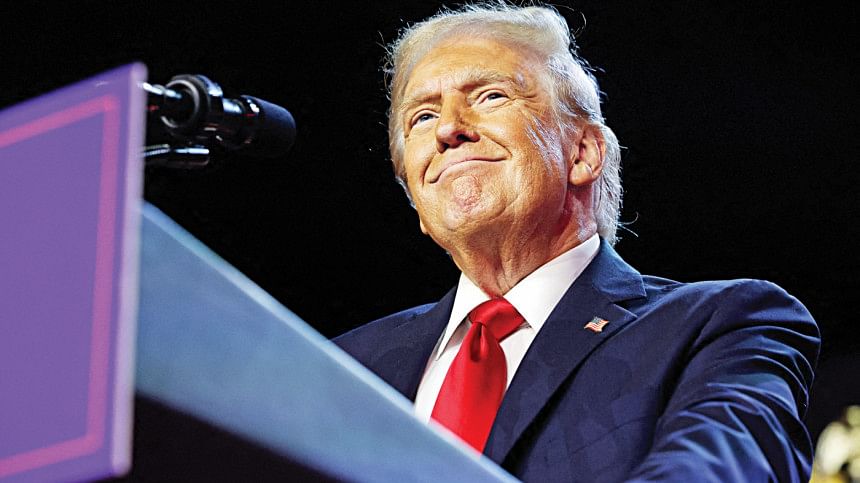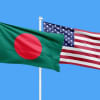What does Trump 2.0 mean for businesses in Bangladesh?

For local business communities, Donald Trump's victory in the presidential race has been shorthand for the expectation that Western apparel orders and some foreign investments would shift to Bangladesh, with global fashion powerhouse China possibly facing higher import tariffs from the US.
However, this calculation requires several favourable conditions to be truly fruitful for Bangladesh.
For instance, inflationary pressure in the US should not depress apparel demand, the global economy must remain vibrant and conflicts in Ukraine and the Middle East should subside, according to local think-tanks and trade experts.
Otherwise, they do not find too many reasons to celebrate Trump's leadership of the US -- which is the single largest export destination for Bangladeshi apparel, with average annual shipments worth more than $10 billion.
"Other than the possible diversion of garment work orders from China to Bangladesh, I do not see any major positive advantage for Bangladesh from the re-election of Trump," said Mustafizur Rahman, a distinguished fellow at local think-tank Centre for Policy Dialogue (CPD).
During his first term, Trump increased tariffs on imports from China from 3 percent to 25 percent in January 2018.
During his campaign, Trump this time announced he would impose higher tariffs of up to 60 percent on Chinese goods if re-elected to the Oval Office.
Meanwhile, Rahman expressed concern about global trade policy during the second term of Trump in the White House. "His global trade policy might not be liberal, which could disadvantage Bangladesh."
Echoing similar views, Mohammad Abdur Razzaque, chairman of private research organisation Research and Policy Integration for Development (RAPID), said increased tariffs on Chinese products may boost apparel orders to Bangladesh.
But seizing this opportunity would depend on the state of the global economy, according to Razzaque, as a global economic slowdown coincided with the higher duties on Chinese goods during Trump's first term.
When Trump imposed higher tariffs on Chinese goods in January 2018, apparel exports from Bangladesh to the US turned negative between July 2019 and February 2020, Razzaque said.
The global economic slowdown, which could result in purchasing power contraction and a demand slump in the US apparel market, would affect apparel exports by Bangladesh, commented the RAPID chairman.
Moreover, he said Trump's protectionist trade policy could raise uncertainty on the global stage and create a gloomy outlook for global investment.
On top of it, global economic cooperation may be affected, including the implementation of the Sustainable Development Goals (SDGs), which could impact rising economies like Bangladesh.
On an optimistic note, Razzaque believes Trump's stance on global affairs, such as his opposition to the continuation of conflicts in Ukraine and the Middle East, might bring stability in those regions and eventually contribute to a smoother global supply chain.
Masrur Reaz, chairman of the Policy Exchange Bangladesh, also said garment work orders may shift from China to Bangladesh due to tariff hikes on imports of Chinese goods by the US.
In the long run, Bangladesh may also attract some foreign direct investment (FDI) with investments shifting from China to other countries due to Trump's imposition of higher tariffs on Chinese goods, Reaz said.
Khandoker Rafiqul Islam, former president of the Bangladesh Garment Manufacturers and Exporters Association (BGMEA), believes that Trump's pledge to impose a 60 percent tariff on Chinese goods would surely benefit Bangladesh.
With a 15.62 percent tariff, Bangladesh exported $8.27 billion worth of garment items to the US last year.
Under both Democratic and Republican administrations, garment exports from Bangladesh to the US remained quite stable.
During Trump's presidency from 2017 to 2021, Bangladesh's share of garment exports to the US fluctuated between 17 percent and 18.90 percent, according to the BGMEA. Under Democratic President Joe Biden, the share did not change dramatically, varying between 21.15 percent and 18.12 percent.
Since the expiration of the Multi-Fibre Arrangement in 2004, Bangladesh has not benefited from any tariff preferences on garment exports to the US.
Before the Trump administration imposed a 25 percent tariff on Chinese goods in January 2018, Chinese exporters faced a 3.08 percent duty on garment exports to the US.
According to the Hong Kong Ministerial Declaration of the World Trade Organization (WTO), the US was supposed to provide duty-free market access for all products from least Developed Countries (LDCs).
However, the US government allowed duty-free market access to only 97 percent of products.
As an LDC, Bangladesh's garment exports were expected to be included in the 97 percent duty-free category, but apparel products were excluded from this package.

 For all latest news, follow The Daily Star's Google News channel.
For all latest news, follow The Daily Star's Google News channel. 






Comments